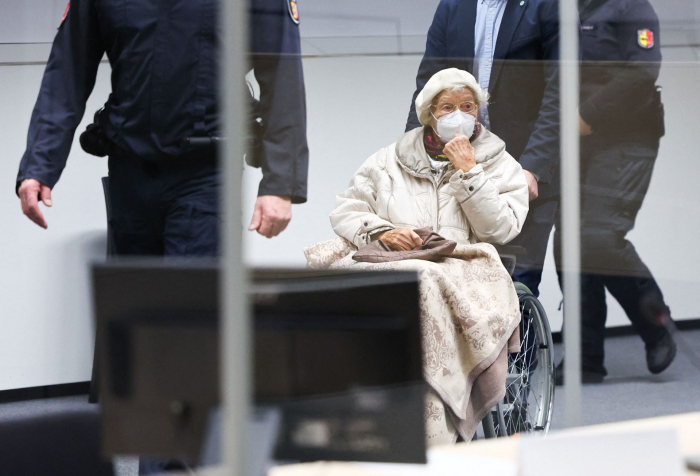A German court on Tuesday rejected the appeal of a 99-year-old former secretary at the Stutthof concentration camp who had been convicted of being an accessory to the murder of more than 10,000 people during World War II.
“(The defendant) not only physically helped the camp commandant and his adjutants, with whom she worked together in a spirit of trust,” the court ruled. “Through her integration into the camp operation as a reliable and obedient subordinate, she also supported them psychologically.”
The former secretary, Irmgard Furchner, was initially convicted by a German court in 2022 for her role in the murder of 10,505 people at the Stutthof camp, in what is now Poland, making her one of the last living Germans to be tried for Nazi crimes.
German media have framed the trial as possibly the last verdict against participants in the Nazi death machine, as most of those involved have died or are unfit to stand trial due to their advanced age.
For most of the postwar period, German prosecutors, in order to convict Nazi concentration camp guards, had to prove their concrete involvement in specific murders. That high bar meant many Nazi offenders were able to escape justice.
But the 2011 conviction of John Demjanjuk, a former Ohio autoworker who was found guilty of being an accessory to mass murder while a guard in the Sobibór concentration camp in Nazi-occupied Poland, established a new German legal precedent, allowing prosecutors to pursue anyone guilty of helping concentration camps function as accessories to mass murder.
That precedent also allowed prosecutors to convict Furchner, who was in her late teens when she worked as the stenographer for the Stutthof commander. Because of her young age at the time, a juvenile court decided on the matter, giving her a two-year suspended sentence.
Furchner’s lawyer argued prosecutors had not been able to prove beyond a reasonable doubt that she had known about the systematic killings at the camp, but the German court in the city of Leipzig rejected that argument in the ruling Tuesday.
“Employees of the administration are less close to the crime, but that is not a criterion for criminal liability for aiding and abetting,” Thomas Will, the prosecutor who heads Germany’s Central Office of State Judicial Authorities for the Investigation of National Socialist Crimes, told POLITICO in a phone interview ahead of the ruling. “Our argument was that the administrative support of mass murder must be accessory to murder.”
Will’s office carries out investigations of suspects in cases involving concentration camps, and then hands over findings to local public prosecutors in the relevant jurisdictions to pursue convictions. Two proceedings are currently underway in the Hanau and Berlin regional courts, Will said, but it’s unclear whether the suspects will be deemed fit for trial. Another case is before the public prosecutor’s office in Neuruppin in the eastern state of Brandenburg.
“We are working on handing over further cases,” he added.
Politico
More about:
















































